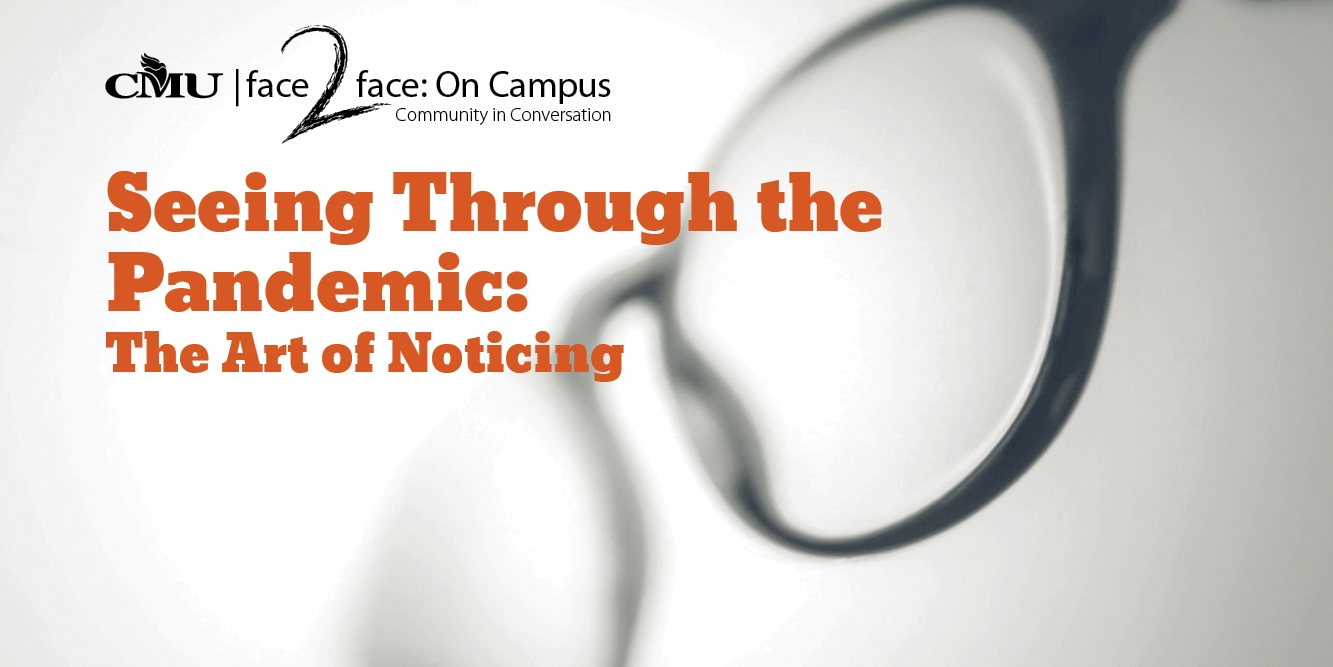News and Releases

Stories
Unmasking anxiety in pandemic times
Wednesday, October 7, 2020 @ 4:37 PM | Stories

Face2Face conversation panel discusses what to notice and how to see during COVID-19
How might COVID-19 invite us to think about the lenses through which we understand the world? Is it possible that this shared pandemic experience can offer new perspectives not only filled with grief, loss, and anxiety?
Out of these questions—posed by students and instructors alike during a CMU summer course—emerged the topic for CMU's 2020 Face2Face event entitled "Seeing Through the Pandemic: The Art of Noticing." While only 15 students were physically present due to current COVID-19 regulations, viewers from across North America tuned in and asked questions online.
The event featured a multi-disciplinary set of CMU faculty panelists, including a music therapist (Lee-Anne Dowsett), sociologist (Rodney Reynar), biologist (Rachel Krause), and a philosopher-theologian (Chris Huebner), and was followed by a question and answer period moderated by Kenton Lobe, instructor of international development and environmental studies at CMU.
"Adapt, adapt, adapt" was the opening call that Lobe offered listeners who may feel paralyzed by the constant bombardment of negativity surrounding the spread of COVID-19. Taking the time to notice that which is often masked behind anxiety in pandemic times will help to adapt us to the present situation.
"Music is a resilience-enhancing activity" said Lee-Anne Dowsett, "it can reduce feelings of anger, guilt, fear, and anxiety." With anxiety increasing by 65% in all Canadians during pandemic times, Dowsett suggested that music creates a shared experience and can reduce feelings of isolation.
Rodney Reynar, commenting on the general malaise of "Zoom fatigue" and quarantine, stated that stories about daily tragedies and death rates can easily distract from the human ability to "rewrite the stories that have drawn us into treacherous ground, whether that be ecologically, personally, or communally."
"Seeing Through the Pandemic: The Art of Noticing"
Disease ecologist Rachel Krause asked listeners to "imagine that COVID is like a great dark room where scientists are equipped with small flashlights to illuminate what is going on." Often science is viewed by the public as a weapon that can battle viruses biomedically through vaccines. By focusing on ecology instead, a new kind of noticing occurs that connects what happens to other species and organisms to everyday lives of humans.
For Chris Huebner, COVID-19 has revealed new ways of interpreting the past. Returning to the 16th century Anabaptist text The Martyr's Mirror, Huebner shared that he was immediately struck by the rhetoric of contagion that appeared on nearly every page. "The virus [Anabaptism] was not biological but heretical," stated Huebner; its various strains circulated through towns, was contracted through singing, and closed borders to inhibit travel. "We have to remember that this particular virus was never eradicated. We had to learn to live with it, to practice toleration."
Started in 2013, Face2Face is a series of conversations organized by CMU, designed to engage the community on a wide variety of current events and issues at the intersection of faith and life.
Related readings:
Tsing, Anna Loewenhaupt. The Mushroom at the End of the World: On the Possibility of Life in Capitalist Ruins. Princeton: Princeton University Press, 2015.
Waltner-Towes, David. On Pandemics: Deadly Diseases from Bubonic Plague to Coronavirus. Vancouver: Greystone Books, 2020.
KEYWORDS: face2face, panel, conversation, faculty, video


 Print This Article
Print This Article